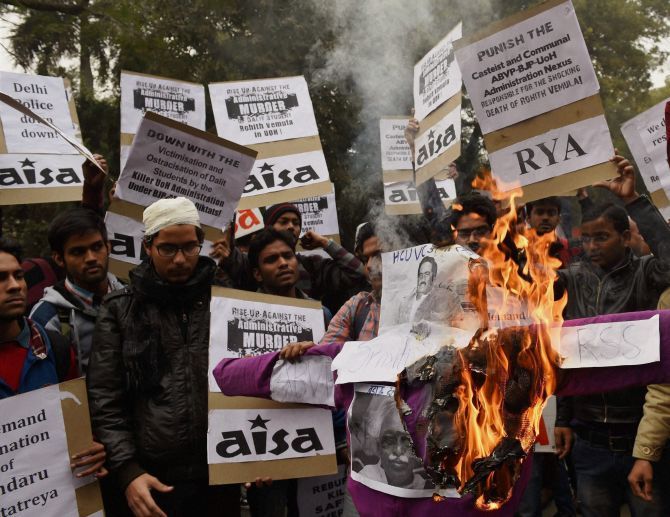
Rohith Vemula's suicide exposes us as a nation, argues Syed Firdaus Ashraf.
Yun toh Syed bhi ho, Mirza bhi ho, Afghan bhi ho, tum sabhi kuch ho, batao to Musalman bhi ho? (You are known as Syeds, Mughals, Pathans. But can you truly claim that you are Mussalman as well?)
Pakistan's spiritual founder, the poet Muhammad Iqbal, wrote these lines, addressing Muslims in the 19th century, when he witnessed how Muslims fought each other.
Iqbal was not alive to see the putative nation's Pakistan, being coined by Chaudhary Rahmat Ali in 1940, having died two years earlier.
The idea of Pakistan and the unity of Muslims -- Iqbal's dream -- was to materialise nine years after his death, on August 14, 1947.
It is obvious that the unity of the Muslim ummah, which Iqbal wanted or had envisioned, was just a myth and far removed from reality. Muslims never were a nation in the Indian subcontinent, as Iqbal wanted, a fact proven after regional aspirations made Bangladesh a reality following Pakistan's humiliating defeat at India's hands in December 1971.
We in India feel proud that India has stood united as a nation despite our many differences.
As a teenager, I saw two issues dividing our country: The Ram Mandir-Babri Masjid issue and the Mandal Commission recommendations, which Prime Minister V P Singh accepted in August 1990.
Caste politics was being resorted to thwart religion-based politics, it was said then.
Unfortunately, the only entity that suffered was the Idea of India itself.
The Mandir movement engulfed India and there were riots across the country as then Bharatiya Janata Party president L K Advani set out on his rath yatra, demanding the construction of a Ram temple in Ayodhya.
Advani's yatra was meant to counter the political impact of the Mandal fire, which had spread across north India in September 1990 when anti-Mandal supporters felt that reservations for the backward castes would deprive them of much valued opportunities and jobs.
The argument the V P Singh government gave when it accepted the Mandal Commission's recommendations was that certain castes in India were backward and so needed to be uplifted economically.
"India needs social engineering," a pro-Mandal activist had told me then. I was in sync with this argument till I visited Uttar Pradesh to cover the 1998 general election. I realised then how dangerous 'social engineering' could be if it was misused.
In 1995, the Bahujan Samaj Party's Mayawati had become UP's chief minister and introduced a controversial legislation called the Harijan Act.
Under this Act, a Dalit/Harijan could file a police complaint against any upper caste individual if s/he felt harassed. As with some laws, this became a tool for blackmail and harassment.
Frivolous cases were filed across the state against the upper castes and if they didn't pay up, they would be put behind bars. (Read Firdaus's 1998 report here)
In other words, since the upper castes had tortured the lower castes for centuries, it was now payback time. And if the backwards were out of power, then the upper castes would tell them it was payback time.
The television news channels and other media have highlighted Rohith's death as the death of a Dalit student. It is a sad and tragic death, but nobody says an 'Indian' student has died.
The uproar over Rohith's suicide harks back to the Mandal days that haunted upper caste and Dalit politics for long.
The BJP has drawn itself into the controversy by stating that the Akhil Bharatiya Vidyarthi Parishad student Susheel Kumar (who was allegedly attacked by Rohith and other students, which led to their suspension and eventually to Rohith's suicide) is himself an OBC.
Human Resource Development Minister Smriti Irani also fell into the caste trap, stating that Union Minister Bandaru Dattareya (who has been charged with abetment of Rohtih's suicide) is a Yadav, that is, from an OBC community.
Is this what we have come to as a nation after 68 years of Independence, 65 years of being a Republic?
Nobody is concerned about the larger picture, of how Indians are spreading hate among themselves and how we don't think of ourselves as one nation.
We are all upper castes, backward castes, Hindus or Muslims, but not Indians.
Iqbal's question needs to be reframed for today's times:
Yun to Dalit bhi ho, Brahmin bhi ho, Musalamaan bhi ho
Tum sabhi kuch batao tum mein koi Hindustani bhi ho?
(You are a Dalit, Brahmin or a Muslim. You are everything, but is any of you Indian?)









